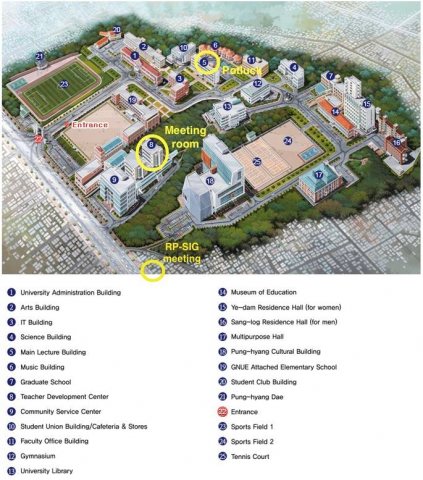
Gwangju-Jeonnam Chapter May Meeting
.
––– Morning Reflective Practice Session –––
Time: 11:00 am - 12:30 pm (3rd Sat., May 19)
Location: Coffee Lab Mujii, near GNUE. (Ground floor of 광주우리교회 Building. Map at bottom.)
ㅡ Topic: Self-Compassion
ㅡ Facilitator: Bryan Hale
––– MAIN MEETING SCHEDULE –––
Time: 3rd Saturday, May 19, 2018, 1:45ㅡ5:00 pm
Location: Gwangju National University of Education (GNUE), Teacher Training Center (교사교육센터) 1st Floor; Room 811. Detailed directions HERE.
1:45 pm: Sign-in and Meet-and-Greet (Admission: Free for newcomers. Membership welcomed.)
2:00ㅡ2:50 pm: Presentation 1
ㅡ Using Technology to Improve Classroom Engagement
ㅡ Aaron Jones (University of Suwon)
2:50ㅡ3:10 pm: Refreshment Break
3:10ㅡ4:00 pm: Presentation 2
ㅡ Students' Struggles and Society: LesBiTrans Migration, Academic, and Employment Experiences in Korea
ㅡ Chelle Jones
4:10ㅡ4:45 pm: Swap-Shop Presentations
Share your Teaching Ideas, Classroom Activities, and Teaching Wisdom with the group.
(Everyone is encouraged to share [up to 5-6 min. each]. Short tidbits are welcomed. Handouts also welcomed.)
4:45 - 5:00 pm: Announcements / Drawing for Door Prizes / Closing
(After-Meeting Dinner at The First Alleyway)
Session Summaries
Using Technology to Improve Classroom Engagement
By Aaron Jones
For teachers arriving in Korea from the West, the question of engagement has always presented various challenges in the classroom. Koreans, unlike their Western counterparts, find life satisfaction from enjoying school. Additionally, life success in Korea remains inexplicably linked to the classroom and the success achieved at school. Therefore, how can foreign language teachers invite their students to enjoy class while also learning effectively?
With the cultural values of Western teachers and Korean students often being vastly different, it can be challenging for teachers to effectively engage students in ways that are not at odds with the general cultural and educational norms. How can foreign language instructors engage students in a culturally sensitive way that does not remove them too far from their comfort zones? Can technology be utilized in the classroom in a way that is relevant to students in Korea and still remain engaging?
This workshop focuses on research and methods for utilizing Korean students’ technological literacy to enhance instruction and engage in a classroom structure known mainly for lecture and testing. Engagement, in and of itself, takes on various forms as it moves across one culture from another. As research has shown, Korean students are engaged in the classroom when they enjoy class and are simultaneously succeeding.
The purpose of this workshop is to present interactive and engaging technology strategies as the bridge between those two concepts. In an increasingly global society, technology remains a constant that can bridge the gap over cultures and, especially with Korean students of almost all ages, can aid them to gain critical thinking skills without removing them from their cultural context. By utilizing technology, foreign teachers are able to fruitfully engage Korean students in language learning without violating their social or cultural constructs in a classroom setting. By the end of the workshop, teachers will have gained useful tools and theoretical understanding that will boost their pedagogy to engage Korean students through technology.
The Presenter

Aaron Jones currently serves as an assistant professor at the University of Suwon’s English Language and Literature Department. Aaron has served as a language instructor at the collegiate level in both Korea and the United States. His research interests include engagement strategies and their effectiveness in regard to cultural context. Aaron received his Master of Arts in Teaching ESL and Master of Arts in Global Leadership from Dallas Baptist University.
Email: ajones@suwon.ac.kr
____________________
ㅡ Students' Struggles and Society: LesBiTrans Migration, Academic, and Employment Experiences in Korea
By Chelle Jones
Chelle Jones draws on ethnographic observation, archival research, and semi-structured interviews to answer the following questions: How is South Korean society shifting in terms of LGBTQ acceptance? What is the status of South Korean law concerning LGBTQ rights? How do LGBTQ migrants perceive their school and workplace environments, healthcare resources, and economic security? How do transgender and lesbian, bisexual, gay, and queer people in South Korea negotiate gender, race, and citizenship status as they secure employment, manage family ties, pursue relationships, and access healthcare?
This presentation is relevant to teachers of students of all ages and all sexual identities, as it provides insights into Korean society and the sociocultural influences shaping students’ identities, perceptions, beliefs, and values – a glimpse, in short, into what students deal with on a daily basis. Teachers will come away with greater understanding of the context surrounding their students, and in particular their LGBTQ students, which can translate into empathetic, supportive classroom practices. [Note: Select materials from this presentation are available in PDF form at the bottom of this page.]
The Presenter

Chelle Jones is an American sociologist who first arrived in South Korea in 2006 and has spent eight years living in the cities of Gwangju and Seoul. Jones is a PhD candidate in sociology and LGBTQ studies at the University of Michigan. Jones graduated from Seoul National University with an MA in Korean studies in 2014. Jones’ fifteen months of dissertation fieldwork are funded by a U.S. Department of State Fulbright Research Grant, Foreign Language and Area Studies Grant, and SeAh Haiam Research Grant.
____________________
Reflective Practice Session
Self-Compassion
With Bryan Hale
 In this meeting we'll look at some ideas and exercises from Mindful Self-Compassion and explore whether or not they could support us as teachers and as people.
In this meeting we'll look at some ideas and exercises from Mindful Self-Compassion and explore whether or not they could support us as teachers and as people.
___________________________
Photo: The Gwangju National University of Education (GNUE / 광주교육대학교), Teacher Training Center (교사교육센터), venue for our main meeting ㅡ 1st floor, Room 811.
____________________
Map: Main Meeting (Building 8) and Reflective Practice session location.

| Attachment | Size |
|---|---|
| 130.17 KB | |
| 945.63 KB |


